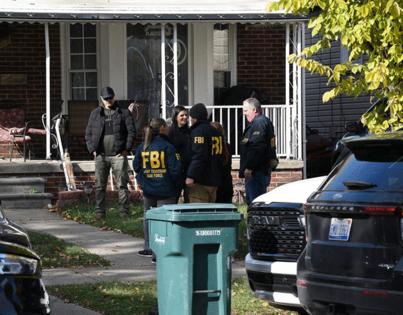Feds file sealed charges vs. Michigan juvenile in Halloween terror case, sources say
Published in News & Features
DETROIT — Federal prosecutors have filed sealed criminal charges against at least one Dearborn, Michigan, juvenile in connection with an alleged Halloween terrorism plot targeting LGBTQ+ friendly clubs in Ferndale and an amusement park, and are holding the 16-year-old male in a rural county jail in Northern Michigan, five sources told The Detroit News.
The case against the teenager, a U.S. citizen, offers a rare test of federal law by allowing a juvenile to be charged in federal court in a criminal case in secret.
The sources spoke on the condition of anonymity because they were not authorized to speak about the investigation.
The 16-year-old is portrayed as one of two would-be attackers in a terrorist plot in support of the Islamic State that federal agents feared was scheduled for the Halloween weekend and the criminal case alleges he practiced shooting firearms at gun ranges last month in preparation for the attack.
The teen is at least the sixth person charged in a high-profile terrorism case that emerged during a series of FBI raids in Dearborn and Inkster on Halloween. Members of an FBI Joint Terrorism Task Force raided the teen's home in Dearborn on Halloween and at least two other locations.
Negotiations are underway to have the teen transferred from the Clare County Jail in Harrison, a three-hour drive north of Dearborn, to the Wayne County Juvenile Detention Facility in the coming weeks, according to two sources familiar with the discussions.
Federal juvenile cases are rare, said Keith Corbett, a defense lawyer and former chief of the federal Organized Crime Strike Force in Detroit who had never heard of a federal juvenile prosecution during his more than 30-year career.
“You’re not going to do this unless you believe the person you’re trying to charge is a significant figure in the crime,” Corbett told The News on Thursday. “I assume they want to send a message that this is serious conduct, but at the same time understand you can’t treat a 16-year-old like a 25- or 30-year-old.”
It was not immediately clear if the 16-year-old from Dearborn eventually would be tried as an adult in federal court in Detroit.
The teen's father and another relative did not respond to messages seeking comment Thursday.
Gina Balaya, a spokeswoman for the U.S. Attorney's Office in Detroit, declined comment.
The federal Juvenile Delinquency Act allows for juveniles to be transferred into the adult criminal justice system in cases that involve especially serious crimes, according to the Justice Department.
Juvenile cases are secret matters. The federal law allows criminal charges to be filed under seal and without a grand jury indictment.
That secrecy extends to the duration of the case as proceedings unfold in courtrooms closed to the public, with non-jury trials and with all records sealed.
A few juvenile criminal cases involving terrorism occasionally emerge nationwide.
In 2017, Santos Colon, Jr., 17, of Lindenwold, New Jersey, pleaded guilty as an adult in a criminal case charging him with attempting to provide material support to terrorists.
Colon, who was arrested when he was 15 and initially charged as a juvenile in a sealed federal case, admitted plotting to attack the Pope during his Papal Mass in Philadelphia and detonating explosives.
Colon was sentenced to time served and 25 years of supervised release with location monitoring for six months.
Abdullah Haji Zada, 18, an Afghan citizen and U.S. resident in Oklahoma, meanwhile, pleaded guilty to a federal gun crime in April in connection with an election day terror plot. He was 17 when he was arrested.
"In general, in ISIS cases, or terrorism cases, the age demographic is trending younger and younger," said Seamus Hughes, a senior research faculty member at the University of Nebraska Omaha’s National Counterterrorism Innovation, Technology, and Education Center (NCITE). "So this is something the FBI and law enforcement is going to have to grapple with."
Hughes said FBI agents typically wait until a target turns 18 before arresting them on terrorism-related charges.
"This is an exceptionally rare set of circumstances," Hughes said.
_____
©2025 The Detroit News. Visit detroitnews.com. Distributed by Tribune Content Agency, LLC.







Comments